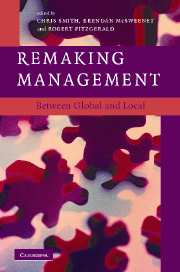Book contents
- Frontmatter
- Contents
- List of tables
- Notes on contributors
- 1 Remaking management: neither global nor national
- Part I Conceptualising International and Comparative Management
- Part II Systems in Transition
- Preface: System as same and different
- 5 The post-socialist transformation and global process: knowledge and institution building in organisational settings
- 6 The diffusion of HRM practices from the United Kingdom to China
- 7 Surviving through transplantation and cloning: the Swiss Migros hybrid, Migros-Türk
- Part III Society as Open and Closed
- Part IV The Search for Global Standards
- Index
5 - The post-socialist transformation and global process: knowledge and institution building in organisational settings
Published online by Cambridge University Press: 06 July 2010
- Frontmatter
- Contents
- List of tables
- Notes on contributors
- 1 Remaking management: neither global nor national
- Part I Conceptualising International and Comparative Management
- Part II Systems in Transition
- Preface: System as same and different
- 5 The post-socialist transformation and global process: knowledge and institution building in organisational settings
- 6 The diffusion of HRM practices from the United Kingdom to China
- 7 Surviving through transplantation and cloning: the Swiss Migros hybrid, Migros-Türk
- Part III Society as Open and Closed
- Part IV The Search for Global Standards
- Index
Summary
Introduction
The theoretical debates about the processes and tendencies of globalisation have been profoundly enriched by the research undertaken over the last seventeen years on the post-socialist transformation. Following the collapse of state socialism, there were many questions about how – and how far – these societies of central and eastern Europe (CEE) would become integrated into the wider context of international capitalism, from which they were more or less isolated from the late 1940s to 1990. There was intense discussion within social science about whether it would be possible to design a path towards a form of market capitalism that would be acceptable to those who saw the events of the late 1980s as an ideological and political victory for the ‘West’. As an example of large-scale societal transformation, the institutional starting point of post-socialism was so distinctive that the CEE region was presented as an ‘immense social laboratory’ (Whitley and Czaban, 1998: 260) for the study of change at all levels of social, economic and political organisation.
The organisational repercussions of the institutional upheaval wrought by the end of state socialism could be conceptualised and explored in terms of internal processes of socio-economic change. External, international and particularly ‘Western’ influences were so strong and deliberate during the 1990s, however, that issues of internal societal transformation could not be credibly separated from those of global power, dominant world ideologies and international institutional fashions.
- Type
- Chapter
- Information
- Remaking ManagementBetween Global and Local, pp. 127 - 155Publisher: Cambridge University PressPrint publication year: 2008
- 1
- Cited by



